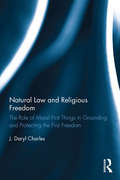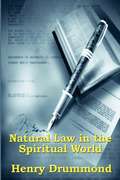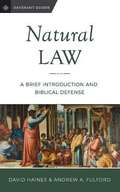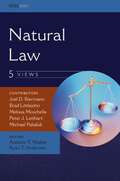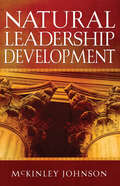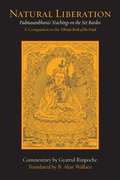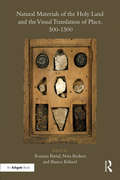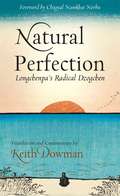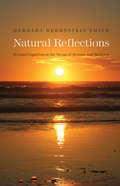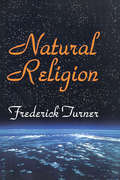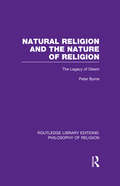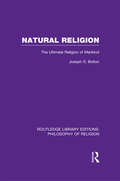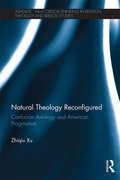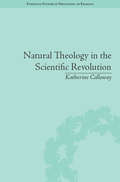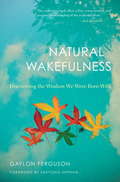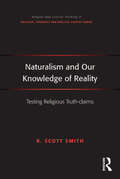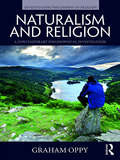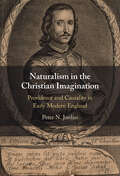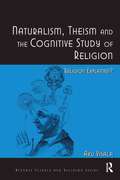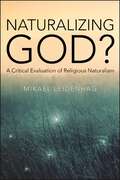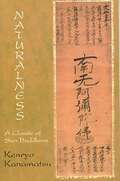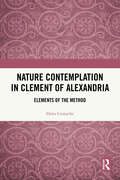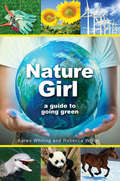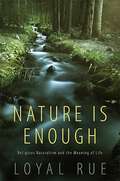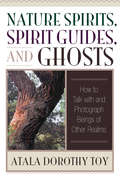- Table View
- List View
Natural Law and Religious Freedom: The Role of Moral First Things in Grounding and Protecting the First Freedom
by J. Daryl CharlesEvery successive generation finds fresh reasons for the study of natural law. Current interest in the natural law may well be due to a pervasive moral pessimism in the Western cultural context and wider contemporary geopolitical challenges. Those geopolitical challenges result from two significant and worrisome global developments – unprecedented violent persecution of religious minorities on several continents and a growing climate of secular hostility toward religious faith in Western societies. Natural Law and Religious Freedom aims to address what is relatively absent from the literature by demonstrating the importance of natural law ethics in both establishing and preserving basic human rights, of which religious freedom has pride of place. Probing contemporary challenges to natural law thinking that are both internal and external to religious faith, and examining the character and constitution of natural law ethics, Natural Law and Religious Freedom will be of interest to theologians, ethicists and philosophers as well as policy analysts, politicians and activists who are concerned to anchor religious freedom and human rights policy considerations in an enduring way.
Natural Law in the Spiritual World
by Henry Drummond"No class of works is received with more suspicion, I had almost said derision, than those which deal with Science and Religion. Science is tired of reconciliations between two things which never should have been contrasted; Religion is offended by the patronage of an ally which it professes not to need; and the critics have rightly discovered that, in most cases where Science is either pitted against Religion or fused with it, there is some fatal misconception to begin with as to the scope and province of either. But although no initial protest, probably, will save this work from the unhappy reputation of its class, the thoughtful mind will perceive that the fact of its subject-matter being Law-a property peculiar neither to Science nor to Religion-at once places it on a somewhat different footing."
Natural Law: A Brief Introduction and Biblical Defense
by Andrew Fulford David HainesAs Christians, we affirm that Scripture is our supreme guide to truth and righteousness. Some wish to go further and assert that it is our only guide. But how then can we account for the remarkable insight and moral integrity that many unbelievers seem to display? Indeed, how to account for the myriad ways in which believers themselves navigate the world based on knowledge and intuition not always derived from Scripture?Enter the doctrine of natural law. <p><p> Frequently misrepresented as an assertion of the autonomous power of human reason or as a uniquely Roman Catholic doctrine, natural law has actually been an integral part of orthodox Christian theology since the beginning, and is even clearly asserted in Scripture itself. <p> In this brief guide, David Haines and Andrew Fulford explain the philosophical foundations of natural law, clear up common misunderstandings about the term, and demonstrate the robust biblical basis for natural law reasoning.
Natural Law: Five Views (CriticalPoints Series)
by ZondervanThe story of "natural law" - the idea that God has written a law on the human heart so that ethical norms derive from human nature - in twentieth-century Protestant ethics is one of rejection and resurgence. For half a century, luminaries like Karl Barth, Carl F. H. Henry, and Cornelius Van Til cast a shadow over natural law moral reflection because of its putative link to natural theology, autonomous reason, associations with Catholic theology, and ethical witness devoid of special revelation. However, over the past twenty years, Protestant theologians have renewed their interest in the subject, often animated by debates on Christian involvement in the public arena and on matters of life, death, and gender and sexuality. Much of this engagement has happened within Reformed circles and has largely been conducted without reference to Roman Catholic construals of the natural law. Conversely, Catholic developments in natural law thinking have paid little attention to the surge of interest on the Protestant side. As a result, Protestant and Catholic natural proponents - and even those skeptical of the natural law - are not in conversation with one another.The lack of dialog between the various schools of natural law has left a historic tradition within Christian moral thought underdeveloped in contemporary Protestant theology. By bringing together a variety of perspectives in much-needed conversation, this book helps readers to understand the various construals of natural law within the broader strands of Christian and classical traditions and clarifies its unique importance for Christian moral witness in a secular culture. The contributors address the following questions:What is natural law?Can moral norms be derived from immanent, creaturely ends? If so, how specific or action-guiding can those norms be? How extensive might these moral norms be?How does natural law endure despite Christian insistence on the noetic, epistemological effects of sin?What is the relationship between Christian reflection on natural law and the broader classical tradition's understanding of natural law?How do Catholic and Protestant construals of natural law differ?What is the relationship between faith and reason?What's the relationship between human nature and natural law?Does "natural law" mean: "secular moral reasons"? Or is "natural law" merely religious belief disguised as public reason?How does natural law relate to public reason?Does the affirmation of a "natural law" lead to a natural theology? Or are these distinct?What is the relationship between natural law and the laws of nature?Five views:Classical Natural Law - Michael PakalukNew Natural Law - Melissa MoschellaReformed Natural Law - W. Bradford LittlejohnLutheran Natural Law - Joel D. BiermanAnti-Natural Law - Peter J. Leithart
Natural Leadership Development
by Mckinley JohnsonAuthor McKinley Johnson gives invaluable direction for reshaping leadership skills and redefining organizations and companies. He defines natural leadership development as &“the process of understanding the environmental influences that shape the nature, character, and authority of leaders.&” Johnson shows how God designed this concept, and if the seed of leadership grows in the right environment, with a leader&’s proper focus on his God-given identity and mission, has a healing impact on society.About the AuthorMcKinley Johnson, the youngest of seven children, is grateful for the discipline and hard work his parents taught him. The fruit of their training includes his service in various leadership roles in the accounting profession for more than eighteen years, and his ministry in church leadership for ten years. He has pursued gradute studies in leadership for several years and has earned a Doctorate in Strategic Leadership (DSL) from Regent University.
Natural Liberation
by Padmasambhava B. Alan Wallace Gyatrul RinpocheIn life and in death, in meditation and in sleep, every transitional stage of consciousness, or bardo, provides an opportunity to overcome limitations, frustrations, and fears. The profound teachings in this book provide the under- standing and instruction necessary to turn every phase of life into an opportunity for uncontrived, natural liberation. Like the Tibetan Book of the Dead, Natural Liberation is a term, a "hidden treasure" attributed to the eighth-century master Padmasambhava. Gyatrul Rinpoche's lucid commentary accompanies the text, illuminating the path of awakening to the point of full enlightenment. Natural Liberation is an essential contribution to the library of both scholars and practitioners of Tibetan Buddhism.
Natural Materials of the Holy Land and the Visual Translation of Place, 500-1500
by Renana Bartal Neta Bodner Bianca KuhnelNatural Materials of the Holy Land and the Visual Translation of Place, 500-1500, focuses on the unique ways that natural materials carry the spirit of place. Since early Christianity, wood, earth, water and stone were taken from loca sancta to signify them elsewhere. Academic discourse has indiscriminately grouped material tokens from holy places and their containers with architectural and topographical emulations, two-dimensional images and bodily relics. However, unlike textual or visual representations, natural materials do not describe or interpret the Holy Land; they are part of it. Tangible and timeless, they realize the meaning of their place of origin in new locations. What makes earth, stones or bottled water transported from holy sites sacred? How do they become pars pro toto, signifying the whole from which they were taken? This book will examine natural media used for translating loca sancta, the processes of their sanctification and how, although inherently abstract, they become charged with meaning. It will address their metamorphosis, natural or induced; how they change the environment to which they are transported; their capacity to translate a static and distant site elsewhere; the effect of their relocation on users/viewers; and how their containers and staging are used to communicate their substance.
Natural Perfection
by Chogyal Namkhai Norbu Keith Dowman Lonchen RabjamDzogchen, or the "Great Perfection," is considered by many to be the apex of Tibetan Buddhism, and Longchen Rabjam is the most celebrated of all the saints of this remarkable tradition. Natural Perfection presents the radical precepts of Dzogchen, pointing the way to absolute liberation from conceptual fetters and leading the practitioner to a state of pure, natural integration into one's true being.Transcending the Tibetan context or even the confines of Buddhist tradition, Longchen Rabjam delivers a manual full of practical wisdom. Natural Perfection is a shining example of why people have continued to turn to the traditions of Tibet for spiritual and personal transformation and realization. Keith Dowman's illuminating translation of this remarkable work of wisdom provides clear accessibility to the profound path of Dzogchen in the here-and-now.
Natural Reflections: Human Cognition at the Nexus of Science and Religion
by Barbara Herrnstein SmithIn this important and original book, eminent scholar Barbara Herrnstein Smith describes, assesses, and reflects upon a set of contemporary intellectual projects involving science, religion, and human cognition. One, which Smith calls "the New Naturalism," is the effort to explain religion on the basis of cognitive science. Another, which she calls "the New Natural Theology," is the attempt to reconcile natural-scientific accounts of the world with traditional religious belief. These two projects, she suggests, are in many ways mirror images--or "natural reflections"--of each other. Examining these and related efforts from the perspective of a constructivist-pragmatist epistemology, Smith argues that crucial aspects of belief--religious and other--that remain elusive or invisible under dominant rationalist and computational models are illuminated by views of human cognition that stress its dynamic, embodied, and interactive features. She also demonstrates how constructivist understandings of the formation and stabilization of knowledge--scientific and other--alert us to similarities in the springs of science and religion that are elsewhere seen largely in terms of difference and contrast. InNatural Reflections,Smith develops a sophisticated approach to issues often framed only polemically. Recognizing science and religion as complex, distinct domains of human practice, she also insists on their significant historical connections and cognitive continuities and offers important new modes of engagement with each of them.
Natural Religion
by Frederick TurnerThere is widespread belief that the world's religions con- tradict each other. It follows that if one religion is true, the others must be false--an assumption that implies, and may actually create, religious strife. In Natural Religion, acclaimed poet, critic and essayist Frederick Turner sets out to show that the natural world offers grounds for stating that all religions are, in some respect, true.Through the ages, various ways have been proposed to resolve religious differences. Some argue for the destruction of all religions but one's own. Others substitute an abstract principle for the real ritual and moral practice of religion. Still others doubt all religious truth and, consequently, all truth. Others accept a kind of pluralistic relativism. This book explores syncretism, whereby all religions are seen as grasping the same strange and complex reality, but by very different means and handles. The idea that all religions are true raises a supervening question: if so, what must the real physical universe be like? Turner approaches these questions in terms of scientific inquiry. There is not enough room in space itself to fit in all theologies; but there may be enough room in time if new scientific descriptions of time's nature are to be believed. Turner argues that in the time-models of contemporary cosmological and evolutionary science all times may be connected and time may be infinitely branched and causally looped so that both forward-in-time and backward-in-time factors may be in operation in the same event. Thus, the fundamental substance of the universe may be information rather than matter or energy. The universe is more like a vast living organism than a vast machine.Turner argues that all existing religions can be shown to fit into this model, which in turn points to deeper implications of religious doctrines, languages and practices. There would be plenty of "room" in such a view of time for a tree of different yet linked religious w
Natural Religion and the Nature of Religion: The Legacy of Deism (Routledge Library Editions: Philosophy of Religion)
by Peter ByrneThis study offers students of religion and philosophy introductory chapters concerning the concept of natural religion. It holds that we can’t engage in useful discussion about the present concept of religion without a knowledge of the philosophical history that has shaped that concept. This is discussed with reference to the notion of natural religion to illustrate certain aspects of deism and its legacy. Originally published in 1989.
Natural Religion: The Ultimate Religion of Mankind (Routledge Library Editions: Philosophy of Religion)
by Joseph Shaw BoltonDriven by the dissatisfaction and turmoil in religion at the time this book was originally published in 1923, the author sets out a belief that all people have an inborn religion and investigates what the future of this religion might be as it changes from age to age. In the short chapters here the author reflects on the current trends in theology at the time and the history of Christianity. This is an early critique of formalised religion and a simple advocacy of natural religion which is a glimpse into the basic philosophy of the early twentieth century.
Natural Theology Reconfigured: Confucian Axiology and American Pragmatism (Routledge New Critical Thinking in Religion, Theology and Biblical Studies)
by Zhiqiu XuClassic natural theology in its logical, rational, Aristotelian presentation has encountered an impasse. Since the Enlightenment, nature has ceased to be a vital topic in theological discussions until a recent revival of interest stemming from ecological and feminist concerns. Provocatively transcending boundaries between Philosophy and Theology, ancient and contemporary, East and West, Natural Theology Reconfigured revitalises the validity and relevancy of Natural Theology, a shipwrecked concept in the West, with the aid of Eastern Confucian Axiology and American Pragmatism.
Natural Theology in the Scientific Revolution: God's Scientists (Pickering Studies in PHIL of Religion #2)
by Katherine CallowayIn the seventeenth century scientific discoveries called into question established Christian theology. It has been claimed that contemporary thinkers contributed to this conflict model by using the discoveries of the natural world to prove the existence of God. Calloway challenges this view by close examination of five key texts of the period.
Natural Wakefulness: Discovering the Wisdom We Were Born With
by Gaylon FergusonThere are two essential elements to the spiritual path says this popular teacher from the lineage of Chögyam Trungpa: (1) understanding that you're already enlightened, already perfect in wisdom right here and now, and (2) accessing that natural wakefulness through spiritual practice. These two aspects depend upon each other and work together. Gaylon Ferguson's teaching on the twin aspects of view and practice is a perfect introduction for the beginning meditator and it offers fresh perspectives for the non-beginner too.
Naturalism and Our Knowledge of Reality: Testing Religious Truth-claims (Routledge New Critical Thinking in Religion, Theology and Biblical Studies)
by R. Scott SmithPhilosophical naturalism is taken to be the preferred and reigning epistemology and metaphysics that underwrites many ideas and knowledge claims. But what if we cannot know reality on that basis? What if the institution of science is threatened by its reliance on naturalism? R. Scott Smith argues in a fresh way that we cannot know reality on the basis of naturalism. Moreover, the "fact-value" split has failed to serve our interests of wanting to know reality. The author provocatively argues that since we can know reality, it must be due to a non-naturalistic ontology, best explained by the fact that human knowers are made and designed by God. The book offers fresh implications for the testing of religious truth-claims, science, ethics, education, and public policy. Consequently, naturalism and the fact-value split are shown to be false, and Christian theism is shown to be true.
Naturalism and Religion: A Contemporary Philosophical Investigation (Investigating Philosophy of Religion)
by Graham OppyThis book guides readers through an investigation of religion from a naturalistic perspective and explores the very meaning of the term ‘religious naturalism’. Oppy considers several widely disputed claims: that there cannot be naturalistic religion; that there is nothing in science that poses any problems for naturalism; that there is nothing in religion that poses any serious challenges to naturalism; and that there is a very strong case for thinking that naturalism defeats religion. Naturalism and Religion: A Contemporary Philosophical Investigation is an ideal introduction for undergraduate and postgraduate students of religious studies and philosophy who want to gain an understanding of the key themes and claims of naturalism from a religious and philosophical perspective.
Naturalism in the Christian Imagination: Providence and Causality in Early Modern England
by Peter N. JordanScience today is often seen as providing the definitive frame of reference for understanding what goes on in nature. Furthermore, the history of science has frequently been portrayed as the story of steady progress in overturning religious explanation in favour of scientific truth. This narrative has been challenged by those who – like the author of this book – recognise that a naturalistic way of looking at the world, which lies at the heart of modern science, has a far richer relationship to religion than many have allowed. Peter Jordan now takes this recognition in fresh and exciting directions. Focusing on key thinkers in early modern England, who located causality within a divine and providential view of the cosmos, he shows how they were able to integrate ideas which today might be dichotomised as 'scientific' and 'religious'. His book makes a compelling contribution to current science and religion debates and their history.
Naturalism, Theism and the Cognitive Study of Religion: Religion Explained? (Routledge Science and Religion Series)
by Aku VisalaThis book provides a critical philosophical analysis of the claim that contemporary cognitive approaches to religion undermine theistic beliefs. Recent scientific work into the evolution and cognition of religion has been driven by and interpreted in terms of a certain kind of philosophical and methodological naturalism. The book argues that such naturalism is not necessary for the cognitive study of religion and develops an alternative philosophical and methodological framework. This alternative framework opens the cognitive study of religion to theological and philosophical considerations and clarifies its relationship to other approaches to religious phenomena. This unique contribution to discussions regarding the philosophical and theological implications of the cognitive study of religion summarizes the so far fragmentary discussion, exposes its underlying assumptions, and develops a novel framework for further discussion.
Naturalizing God?: A Critical Evaluation of Religious Naturalism
by Mikael LeidenhagCan nature be considered a religious object? Religious naturalists answer yes, as they seek to carve out a middle path between supernaturalism and atheistic secularism. In this book, Mikael Leidenhag critically examines the religious proposals, philosophical commitments, and ecological ambitions of key religious naturalists, including Willem B. Drees, Charley D. Hardwick, Donald Crosby, Ursula Goodenough, Stuart Kauffman, Gordon Kaufman, Karl Peters, and Loyal Rue. Leidenhag argues that contemporary religious naturalism faces several problems, both with regard to its understanding of naturalism and the ways in which it seeks to uphold a religious conception of reality. He evaluates possible routes for moving forward, considering naturalistic and theistic proposals. He also analyzes the philosophical thesis of panpsychism, the idea that mind is a pervasive feature of the universe and reaches down to the fundamental levels of reality. The author concludes that panpsychism offers the most promising framework against which to understand the metaphysics and eco-ethical ambitions of religious naturalism.
Naturalness: A Classic Of Shin Buddhism
by Kenryo KanamatsuEssays covering a wide range of subjects: spiritual symbolism, the afterlife, and more.
Nature Contemplation in Clement of Alexandria: Elements of the Method
by Doru CostacheThis book examines Clement of Alexandria’s interdisciplinary approach to nature contemplation—which he terms “physiology” and “physics”—showing its internal consistency even in the absence of a clear methodological outline.It reconstructs Clement’s method of nature contemplation, which, while discernible throughout his writings, does not feature as such in one place. Yet it exists within the second stage of the broader threefold roadmap of spiritual advancement, which progresses from ethics to physics to divine vision (“epoptics”). Specifically, Clement’s physics itself has three steps: analysis, interpretation, and the spiritual vision of the world. To advance through the three stages of physics, one must acquire virtue, contemplative skills, and sound information regarding the nature of things. But only transformed people, whom Clement calls “holy gnostics,” saintly sages, have access to the final stage, “gnostic physiology.” This third step amounts to an insightful—“noetic”—perception of nature irreducible to either keen observation or the information gathered and processed by way of analysis and interpretation. This book presents Clement’s method against the backdrop of ancient disciplines of nature contemplation—and as paving the way for contemporary science-engaged theology.The volume is suitable for postgraduate students and scholars of the history of science and religion, religious studies, early Christian and late antique studies, and patristic studies, particularly those working on Clement of Alexandria.
Nature Girl: A Guide to Caring for God's Creation
by Karen Whiting Rebecca WhiteLove God, Love the Planet As you become an expert in all things green, Nature Girl offers fun ways to care for God’s creations while enjoying the wonders of nature! With activities, recipes, science experiments, and much more, you can discover how to create recycled jewelry, plan a spa day with friends, make your own earth-friendly skin care products, or team up to clean a park or a neighbor’s yard. Each chapter covers different topics, like water, air, energy, and recycling, and includes crafts, Scripture, games, quizzes, interviews with experts, and quotes from real girls like you. From the itty-bitty flowers at your feet to the air high above your head, discover how you can make a difference for our planet.
Nature Is Enough: Religious Naturalism and the Meaning of Life
by Loyal RueNature is enough: enough to allow us to find meaning in life and to answer our religious sensibilities. This is the position of religious naturalists, who deny the existence of a deity and a supernatural realm. In this book, Loyal Rue answers critics by describing how religious naturalism can provide a satisfying vision of the meaning of human existence.The work begins with a discussion of how to evaluate the meaning of life itself, referencing a range of thought from ancient Greek philosophy to the Abrahamic traditions to the Enlightenment to contemporary process and postmodern philosophies. Ultimately proposing meaning as an emergent property of living organisms, Rue writes that a meaningful life comes through happiness and virtue. Spiritual qualities that combine evolutionary cosmology and biocentric morality are described: reverence, gratitude, awe, humility, relatedness, compassion, and hope. Rue looks at why religious naturalism is not currently more of a movement, but nevertheless predicts that it will become the prevailing religious sensibility.
Nature Spirits, Spirit Guides, and Ghosts
by Atala Dorothy ToyBoulders laugh, trees talk, and practically each patch of ground has meaning, in Atala Toy's experience. Faeries, angels, ghosts, orbs, and spirits of place are just some of the life forms with which she helps us attune-and shows us how to record their image! Readers will cherish her rare combination of esoteric wisdom and practical guidance. With substantive clarity, she explains time travel, portals, dowsing, negative and positive vortexes, balls of energy known as merkabahs, ley lines, and orbs-the plasma of some life form visible to human eyes or to cameras, many of which are nature spirits who enjoy being around happy energy and so are often seen at parties and spiritual gatherings. A professional interdimensional communicator, Atala is up to the minute in her understanding of the emerging field of spiritual sciences and the correlations between modern physics and ancient metaphysical traditions that perceive the oneness of all nature. We all communicate interdimensionally every day, she says. We just don't know it, and so we lose out on the many ways to receive help from the other life forms who share our space. Drawing on her own and her clients' experiences, she teaches through colorful stories and her own powerful photographs. Titles include "The Ghost Who Washed Dishes," "The Haunted Hotel," "The Guardian of the Spring," "The Horse Who Knew More Than His Owners," "The Jilted House," "The Stranded Gnome," "The Moss Faery," "The Owl on Turtle Island," and "The Balsam Who Loved the Birch." She also includes lessons explaining the energetic principles of the situation; simple exercises for mastering the principle contained in the story; and tips for photographing other life forms using technology available to anyone, such as digital or even cell phone cameras.By entering the fascinating realm of this book, the reader will join the growing number of people aware of subtle energy and able to see through the veils between dimensions. Not only is this possibility personally enriching, it serves a broader purpose as well. Needless to say, the planet and everything on it is at a critical juncture. In damaging the earth, we have damaged the nature beings' home as well. It is therefore strongly in their interest to assist us in transforming the earth into something better. This book shows us how to learn from and enjoy them in a most delightful way.
